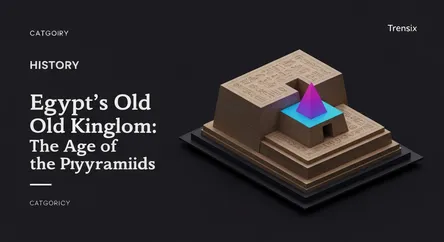History
Egypt's Old Kingdom: The Age of the Pyramids

Discover the Old Kingdom, ancient Egypt's first great era of civilization, renowned for the construction of the iconic pyramids and powerful pharaohs.
What is it?
The Old Kingdom is the name given to the period of ancient Egyptian history from roughly 2700 to 2200 BC. It was the first of three "golden ages" of Egyptian civilization and is famously known as the "Age of the Pyramids." During this time, Egypt was ruled by a strong, centralized government with the king, not yet called a pharaoh, as a divine ruler. The capital was located at Memphis. This era saw remarkable advancements in architecture, art, and technology, fueled by a prosperous economy based on the fertile lands of the Nile.
Why is it trending?
The Old Kingdom represents a foundational period in world history, marking one of the earliest examples of a powerful, unified state. Its monumental achievements, particularly the Step Pyramid of Djoser and the Great Pyramids of Giza, continue to fascinate people and showcase incredible engineering and organizational skills. This era established many of the cultural and religious traditions, like the divine status of kings and complex burial rituals, that would define ancient Egypt for millennia. Its legacy is a cornerstone of historical and archaeological study, continually revealing insights into early human civilization.
How does it affect people?
The society of the Old Kingdom was highly structured, with the divine king at the top. For ordinary people, life was largely agricultural, dictated by the annual flooding of the Nile. A significant portion of the population, mostly peasants, were drafted to work on massive state-sponsored construction projects like the pyramids and temples during the off-season for farming. This labor was not slave labor but a form of taxation and civil service. The king's absolute power meant he could demand the service and wealth of his subjects to complete these projects, which were believed to ensure the stability and prosperity of the entire kingdom.